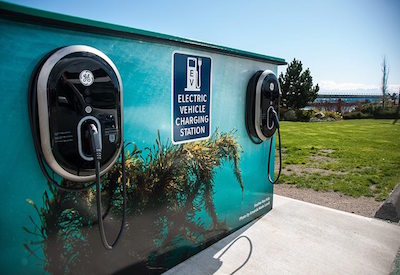BC Government Charging Up Electric Vehicles

To encourage more British Columbians to drive electric vehicles (EVs) and reduce greenhouse gas emissions, the province is providing funding from the Clean Energy Vehicle (CEV) Program to expand and upgrade residential and public charging infrastructure.
The program will support two charging station initiatives with funding as follows:
- $688,500 for incentives for Level 2 charging stations in multi-unit residential buildings, such as apartment blocks and strata complexes. The program is open to individuals anywhere in the province that reside in an eligible multi-unit residential building, or to parties authorized to make decisions regarding the building (e.g., building managers or owners, and strata councils). Approved applicants would be eligible to receive a rebate of up to 75% of the total, before-tax cost of installing a Level 2 EV charging station to a maximum of $4,500.
- In partnership with BMW Canada and BC Hydro, $276,500 to upgrade 10 public, single-standard DC fast charging stations (DCFCs) to dual-standard chargers. The upgrades will enable the chargers to offer both styles of charging standards (SAE Combo and CHAdeMO). These 10 stations currently use only the CHAdeMO charging standard, which was the only standard available at the time they were installed. The upgrade is required so these DCFC stations can serve all models of EVs. Standard industry practice now is to have both charging standards on DCFC units. BMW is contributing $110,000 for the upgrades and BC Hydro will provide $106,500 as contributions-in-kind for technical expertise and labour to perform the upgrades.
The Multi-Unit Residential Building Charging Program will be managed on behalf of the province by the Fraser Basin Council, while upgrades to the province’s DCFC network will be managed on behalf of the Province by BC Hydro. These programs build on CEV investments announced earlier this month at the 2016 Globe Conference on Sustainability and Innovation. In response to strong demand for clean-energy vehicles the province announced an additional $6.89 million for the Clean Energy Vehicle Program to ensure purchase incentives continue to be available for British Columbians who choose a qualifying electric or hydrogen fuel cell vehicle, and for further investments in programs under development to expand public and residential charging infrastructure and encourage fleet purchases of CEVs.
The province introduced the CEV Program in 2011 and has since committed more than $31 million to make CEVs more affordable and reduce greenhouse gas emissions.
Photo courtesy of BC Government News.











![Guide to the Canadian Electrical Code, Part 1[i], 26th Edition– A Road Map: Section 56](https://electricalindustry.ca/wp-content/uploads/2022/11/Guide-CE-Code-2.png)



